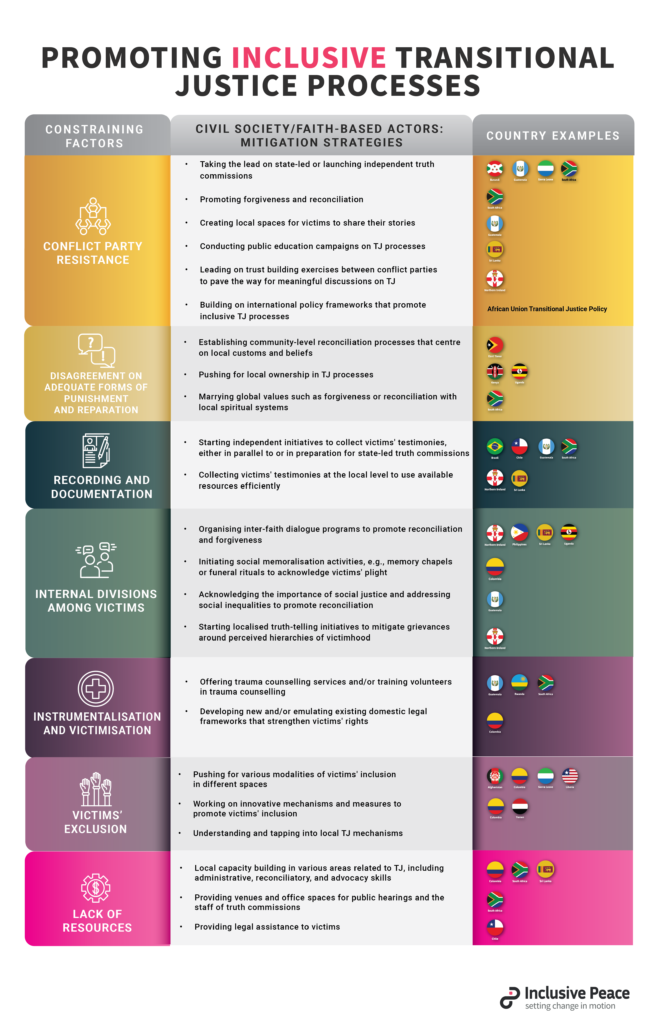Inclusive Peace learnings: How civil society and faith-based organisations can overcome challenges to inclusive transitional justice processes
Transitional justice processes play a pivotal role in addressing past wrongs, holding perpetrators accountable, and providing reparations to victims. The processes are complex and challenging, which require the cooperation and commitment of various stakeholders.
In this Inclusive Peace learning we have outlined the seven most common constraints and how civil society organisations and faith-based actors can work on the mitigation of these challenges with country examples. These learnings are based on our comparative knowledge from peace processes worldwide.
The seven constraints to inclusive transitional justice processes include (but are not limited to)
→ conflict party resistance
→ disagreement on adequate forms of punishment and reparation
→ recording and documentation
→ internal divisions among victims
→ instrumentalisation and victimisation
→ victims’ exclusion
→lack of resources
Seven constraints to inclusive transitional justice processes
Conflict Party Resistance
Resistance from parties involved in the conflict is one of the major constraints of transitional justice processes. The resistance can manifest in various forms, from attempts to obstruct accountability mechanisms, the unwillingness to cooperate with investigations to actively undermining the truth-seeking efforts. The lack of cooperation from key actors can make it difficult to achieve justice and reconciliation.
Disagreement on Adequate Forms of Punishment and Reparation
Transitional justice processes often encounter challenges in determining the appropriate forms of punishment and reparation for perpetrators and victims, respectively. Stakeholders may have different opinions on what constitutes justice, leading to tensions and disagreements. For example, societies may be divided on issues like capital punishment, amnesty, or alternative forms of justice such as truth commissions or community-based reconciliation. Likewise, disagreements may arise regarding the extent and scope of reparations, creating tensions among stakeholders seeking to achieve justice while promoting societal healing.
Recording and Documentation
After a period of conflict, evidence may be lost or destroyed, making it difficult to identify perpetrators and bring them to justice. Insufficient documentation can undermine the credibility of a transitional justice process. Accurate and comprehensive documentation is vital to any successful transitional justice process.
Internal Divisions among Victims
It is common for conflict situations to fracture societies and result in victims belonging to different ethnic, religious, and social groups being siloed. As a result of these divisions, the solidarity necessary to pursue justice collectively can encounter barriers. Furthermore, some victims would prefer retributive justice, which seeks harsh punishment for perpetrators, while others would be interested in restorative justice, which emphasises healing and reconciliation.
Instrumentalisation and Victimisation
Transitional justice processes can be manipulated for political gain by elites and others with vested interests. These actors may use the justice system to target political opponents or avoid accountability themselves, while victims may face further victimisation such as through re-traumatisation or stigmatisation if they participate in justice-seeking initiatives.
Victims’ Exclusion
In many cases, marginalised groups, such as women, minorities, or indigenous people, are excluded from transitional justice processes, which poses a significant challenge to its legitimacy and effectiveness. This can lead to the continued marginalisation of these groups leaving them feeling helpless and unsatisfied, which would hinder efforts to achieve a comprehensive and inclusive reconciliation.
Lack of Resources
Transitional justice processes are time-consuming, requiring adequate funding and infrastructure. Many countries emerging from conflict may lack the necessary financial and human resources to establish and sustain effective justice mechanisms. This limitation can result in delayed or compromised justice outcomes, furthering the frustration of victims and impeding the path to lasting peace.
Want to learn more about transitional justice?
In our blog series, PEACEBUILDING LESSON, Transitional justice and reconciliation expert Tecla Namachanja shares her experience of the use of various mechanisms found in Kenya to provide support to those who suffered violent conflict and human rights violations.
Top featured photo: “Enhancing Relationships in The Gambia” by Diplomatic Security Service is marked with Public Domain Mark 1.0.


